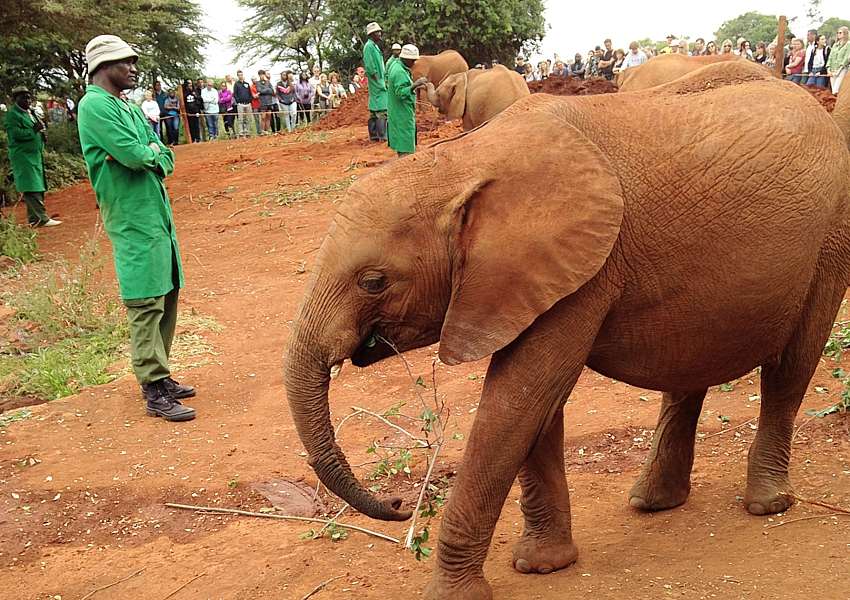Elephant conservation and understanding of our animal friends, wildlife tourism

WITH LITTLE TO cheer about on the Australian native animal conservation front, it was encouraging to hear that as a member of the International Convention opposing Trade in Endangered Species of Fauna, our representative, [federal environment minister] Sussan Ley joined Australia to the list of countries agreeing to ban the import of ivory.
Unfortunately, not all countries have agreed to this ban and thousands of elephants are still being killed every year for their tusks. China hasn’t signed and it is the biggest customer.
I visited a National Park in Nairobi, Kenya (image above) where an elephant nursery exists to foster baby elephants which have lost their mothers from poaching, snaring, or trapping as part of the illegal but on-going trade in ivory tusks, or as a result of natural hazards such as falling down wells or being swept away while crossing flooded rivers.
It was a thrill to witness a long line of half-grown, rescued elephants trumpeting with happy anticipation as they trooped in to the tourist area to be fed enormous bottles of milk before rolling in the dirt and following their keepers back to the bush, where they spend a part of each day before returning to their rooms.
”Baby elephants are sensitive, intelligent creatures that grow up in the care and protection of the herd.” Australian wildlife carers observed the same about orphaned natives, like kangaroo joeys.
 The elephant nursery is the public face of the Sheldrick Wildlife Trust (SWT) founded by Dame Daphne Sheldrick in 1977 in memory of her husband David Sheldrick, first warden of Tsavo National Park, and a dedicated conservationist. Daphne (pictured) was an English girl who grew up as a child in the highlands of Kenya with a bevy of animal pets to care for. Her love for animals led to a passion for elephants threatened with extinction in the wild.
The elephant nursery is the public face of the Sheldrick Wildlife Trust (SWT) founded by Dame Daphne Sheldrick in 1977 in memory of her husband David Sheldrick, first warden of Tsavo National Park, and a dedicated conservationist. Daphne (pictured) was an English girl who grew up as a child in the highlands of Kenya with a bevy of animal pets to care for. Her love for animals led to a passion for elephants threatened with extinction in the wild.
Respect and nature’s balance
In one of her books Daphne wrote: “Animals are more complex, and in many ways more sophisticated than us. They are more perfect because they remain within Nature’s perfect symmetry just as Nature intended. They should all be respected and revered, but perhaps more none more so than the elephant, the world’s most emotionally human land mammal.”
Baby elephants are sensitive, intelligent creatures that grow up in the care and protection of the herd. When Daphne adopted orphaned babies she learnt from hard experience that they needed lots of attention and a special diet of no-fat cow’s milk and coconut oil in order to survive.
This requirement along with their need for human company makes it necessary for them to be fed every three hours for 24 hours with gradual weaning from the bottle over a fairly lengthy period of time. Like human babies elephant babies need warmth, security, and company. They sleep under blankets next to their keepers for comfort when they’ve been abandoned or injured.
The ties that bind
Kenyan keepers at the nursery are required to move from one orphaned elephant to another in order for them not to form a bond so close that it will inhibit the elephant’s later acceptance by the herd and result in a reduced chance of survival in the wild.
In order to achieve successful rehabilitation and give young elephants a greater chance to achieve independence, a half-way house — where they are free to come and go — has been established in a different area of the park. As one keeper said emphatically: “These elephant babies are kept, not for zoos or circuses, but to be released back into their natural habitat!”
Even so there are times when elephant attachments are so strong that ex-orphans successfully assimilated with wild ones in their natural habitat are still known to return to the stockades. They are likely to do this for help when injured, or alarmed, or even just to show off new-born calves [similar situational returns have been noted for Australian macropods]. As Daphne said in one of her many public lectures in America and London, “elephants never forget”.
As knowledge of the success of Mama Elephant’s nursery grew locally, the Wildlife Fund was able to expand its fundraising, and conservation education activities overseas with lectures, books, and a documentary film Born to be Wild. Daphne Sheldrick was made a Dame of the British Empire by the British queen; and honoured by the Kenyan government and the United Nations for her life work in animal conservation.
Inspiring work goes on
The Sheldrick Wildlife Trust, even after the death of its founder in 2018, still carries out all aspects of its animal rescue and rehabilitation work. Including alerting people to the alarming rate of animal extinction, and the importance of preserving natural habitats. Best known for its pioneering Orphans Project, the SWT working in conjunction with the Kenya Wildlife Service currently funds and operates 14 de-snaring teams, as well as supporting the work of rangers, financing mobile veterinary units and operating 14 surveillance planes in order to combat elephant and rhino poaching.
In the words of David Attenborough, in his book A Life on our Planet: “Nature is far from unlimited. The wild is finite. It needs protecting.”
We are indebted to Daphne Sheldrick and conservationists like her who devote their lives to the protection of precious wildlife.
By Susan Cruttenden, Dalmeny, NSW
Images Author supplied.
